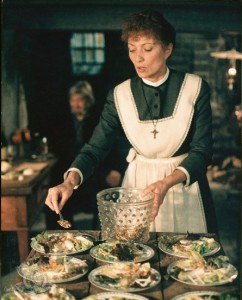Does Babette develop her masterful plan with this context in mind? Probably more than likely. She orders a great deal of fine china, glassware, and gourmet ingredients from France, leaving the sisters horrified. This wasn’t what they had envisioned at all! And the wine! How can they, intemperates that they are, drink wine? One sister has a terrible nightmare in which the poor turtle (shipped alive from France and soon to be made into turtle soup) rears its head, and blood-like wine is spilled out on a table while the flames of hell rise amidst all of this strange, surely devilish, food. Wrought in spirit, the sister confesses to the community her error in allowing Babette to make this meal. Astonishingly, they respond that they will eat the meal and not say a word about it. This is their attempt to be gracious, even though they worry the meal might not be according to their faith. Being gracious to Babette is placed above strict adherence to legalism.
(An aside: This strikes me as an amazing concession from such austere, pious people. They will be good guests and trust God to sort it out. I wonder how this approach might be helpful to the baking of certain cakes for certain kinds of weddings–and other comparable examples. Perhaps Presidential candidate John Kerry was right when he advised Christian business owners to serve customers that they disagree with and to simply silently pray for them as they leave the business. This film makes me ask: How can Christians still live by our principles in this day and age, and yet also remain hospitable and gracious toward those around us who might have other beliefs or practices?)
The truly wonderful thing about this film is that it doesn’t make fun of the villagers or insist that their sacrifices are unimportant (they do, after all, work hard to serve those in need). In fact, the sisters’ old suitors testify that they went on to live lives of success and prestige, only to find those pursuits ultimately wanting. They testify that the sisters chose a better way.
So, it is from a place of deep respect of the sisters’ faith that the film proceeds with its critique. Mark Le Fanu writes, “The feast given by Babette to the pious townspeople opens their minds to the notion that the pleasures of the senses aren’t necessarily sinful, but the satire involved here is very gentle, and it would be false to interpret the great sequence we are talking about as some simple endorsement of epicureanism.” Sacrifice on behalf of God and neighbor is valued in this film, but so is the appreciation of all of the created order which divine largesse has made. Rightly appreciated, the smell, taste, touch, sound, and sight of this beautiful world need not be something to be feared, but rather something to be embraced, as a reminder of the graciousness of our Creator, and as a hope of the resurrection and new creation to come.
 As the guests gather around Babette’s table, initially they are cautious of all of these rich delicacies. But slowly, as they acclimate to the lavish grace being bestowed upon them, they begin to become more comfortable with its joy. And in the midst of the sharing of the meal together, reconciliation begins to happen and brotherhood and sisterhood is rekindled. A meal can do this and hospitality in general can do this, creating warmth of heart and unity. In one church I have been a part of, we were at one time experiencing some conflict and stress among our members. As we gathered for a meeting with aggrieved members, there was some tension and stress among some of us. There was fear too. Then, one of our council members with a particular flair for hospitality came and began to make some coffee. She poured it into our white carafes and moved around from member to member, smiling warmly and offering them coffee to drink. Among Lutherans, coffee is a bit of a sacrament, of course. It was night and not everyone partook, but everyone was warmed by her hospitable presence and by the community she created around the coffee pot. I believe her gift greatly contributed to the positive, constructive spirit with which the gathered members began to talk. We were not separate people, alienated from one another; we were a gathered family. This is only one of a great number of things I have seen this woman do to bring community, love, and warmth to the room when she enters. Such simple things, yet such great blessing.
As the guests gather around Babette’s table, initially they are cautious of all of these rich delicacies. But slowly, as they acclimate to the lavish grace being bestowed upon them, they begin to become more comfortable with its joy. And in the midst of the sharing of the meal together, reconciliation begins to happen and brotherhood and sisterhood is rekindled. A meal can do this and hospitality in general can do this, creating warmth of heart and unity. In one church I have been a part of, we were at one time experiencing some conflict and stress among our members. As we gathered for a meeting with aggrieved members, there was some tension and stress among some of us. There was fear too. Then, one of our council members with a particular flair for hospitality came and began to make some coffee. She poured it into our white carafes and moved around from member to member, smiling warmly and offering them coffee to drink. Among Lutherans, coffee is a bit of a sacrament, of course. It was night and not everyone partook, but everyone was warmed by her hospitable presence and by the community she created around the coffee pot. I believe her gift greatly contributed to the positive, constructive spirit with which the gathered members began to talk. We were not separate people, alienated from one another; we were a gathered family. This is only one of a great number of things I have seen this woman do to bring community, love, and warmth to the room when she enters. Such simple things, yet such great blessing.
The film concludes with the surprise that Babette’s lavish gift has in fact been the giving of all. There is nothing left and she will not be returning to Paris–but never fear, for “an artist is never poor.” Like Jesus, Babette gives the full measure, her very being, not fearing loss but daring greatly. She dares to spread every last bit of love and grace.
Playing it safe is not Divine. … Love is the widest, choicest door into the Passion. God saved the world not by sitting up in heaven and issuing antiseptic directives, but by becoming man, and vulnerable, in Jesus. He died, not because He despised the earth, but because He loved it as a man loves it–out of all proportion and sense. And when He rose again, He stood up like a man indeed: with glorious scars–and with flesh, bones, and all things appertaining to the perfection of man’s nature.
It is through that Sacred Humanity–and through the mighty working whereby He is able to subdue all things to Himself–that He will, at the last day, change these corruptible bodies of ours, make them like His own glorious Body and, through them, draw all things into the last City of their being.–Robert Farrar Capon, The Supper of the Lamb (190)
There is nothing like a feast to open our eyes to the new creation to come. A creation in which we are once again rightly oriented toward one another, reconciled, restored. A creation in which there is rejoicing, community, and unity. This Easter, I wish for you such a good feast that it not only satisfies your body now but also makes you hunger and thirst for the Feast to come.
On what are you feasting this Easter?
How does the idea of the coming kingdom of God as a feast strike you?
——————-
Community discussion guidelines:
Because this is a Christian blog, the things I’m talking about will obviously be topics that people feel strongly about in one direction or another. Please keep in mind that this is a place for substantive, respectful, constructive conversation. All perspectives are welcome to discuss here as long as all can treat each other with kindness and respect. Please ignore trolls, refuse to engage in personal attacks, try not to derail the conversation into divisive rabbit trails, and observe the comment policy listed on the right side of the page. Comments that violate these guidelines may be deleted. Vulgar remarks may result in immediate blacklisting. For those who clearly violate these policies repeatedly, my policy is to issue a warning which, if not regarded, may lead to blacklisting. This is not about censorship, but about creating a healthy, respectful environment for discussion.
P.S. Please also note that I am not a scientist, but a person with expertise in theology and the arts. While I am very interested in the relationship between science and faith, I do not believe I personally will be able to adequately address the many questions that inevitably come up related to science and religion. I encourage you to seek out the writings of theistic or Christian scientists to help with those discussions.
———————-
Image credit: Still of Stéphane Audran in Babette’s Feast (1987). © 1987 Metro-Goldwyn-Mayer Studios Inc. All Rights Reserved. Source: IMDB.com.
Image credit: Still of Vibeke Hastrup in Babette’s Feast (1987) . © 1987 Metro-Goldwyn-Mayer Studios Inc. All Rights Reserved. Source: IMDB.com.
Image credit: Still of Stéphane Audran in Babette’s Feast (1987). © 1987 Metro-Goldwyn-Mayer Studios Inc. All Rights Reserved. Source: IMDB.com.












